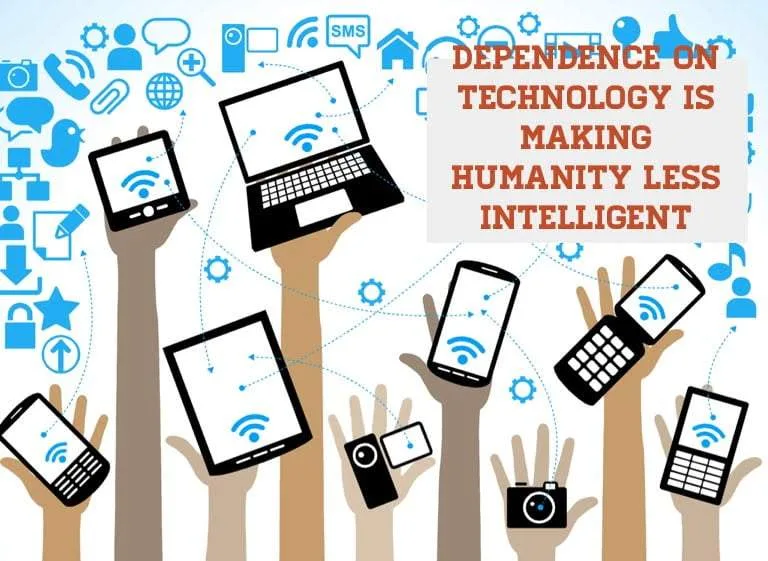Does technology making us less intelligent? It does seem that way, don’t you think? Well, you have every right to think that way. In fact, many psychologists believe that humans are becoming less intelligent over time. In the ’60’s people were saying that technology was replacing human beings, but that is simply not so.
Technology has always changed and will always change, it is inevitable. The computer in your home plays a major role in how much you can do in the world. You may be thinking to yourself that I don’t need a computer, all I need is the Internet. That could be true, but think about the other things you use technology for.
Telephones, microwaves, automobiles, planes, trains, and even dating services have been around for a long time. Do we really need all of that technology? Are people just using technology to get along in life? If people use technology to make more money and have more options then why would we need the computers they have?
Now then, technology has helped us with telephones, microwaves, cars, airplanes, and dating, but it also has taken away other things from us.
We used to be able to study and train for years in school and not worry so much about technology at home. Now we can watch TV all day, but do we really need that? Have our children become more dependent on their cell phones?
This goes back to needing technology. Why? Because technology allows us to use the computers we already have to help us in our day to day lives. However, all of these technology items cost money. What is the reason that we have to spend so much money on these things?
The main reason is because there is always a need for more technology. Some people will say that we should spend it on helping people around the world. However, if people want to have more free time they should focus on technology that will allow them to do what they like while still being able to get the job done.
Personally, I feel that technology is not making us less intelligent. In fact, it is the reverse, as technology allows us to see things that we could not see before.
Think about all of the technology items that you use every day. How many do you not use very often? Computers, cell phones, microwaves, and televisions are all wonderful technology items.
They allow you to communicate with other people at amazing speeds, to find information at the click of a button, and to use simple tools such as a screwdriver and a knife. They also allow you to become a better worker and to create more wealth in your life.
While there are those who will say that technology is bad because it keeps people from interacting with each other, this is not really an argument that can be made.
Of course technology can make communication easier and quicker, but it also allows you to learn more about your fellow man. You can now surf the internet for fun rather than just reading magazines and books. So while it may make us less intelligent, it is also making the world a better place.
Is technology making us less intelligent? On one hand, it has allowed us to learn more and to enjoy more. We no longer have to wait for books or magazines to reach us when we need to know something new.
We can simply tune into a program or read it over the internet, if we want to know more. This means that we no longer have to rely on someone else to do the jobs for us.
Another reason that technology may be making us dumb is that it has also taken away some of our personal freedom. For instance, instead of driving down a road and finding a good road to drive on, we now depend on our GPS systems.
And we are not only using our GPS systems to get from point A to point B; we are also using our GPS systems to plan our vacations. Are we planning our vacations any differently now than we would have years ago? We are literally trapped in a technological gridlock.
Points on how technology can potentially make us less intelligent
- Dependency on Search Engines: With the vast amount of information available at our fingertips through search engines like Google, there’s a tendency to rely on them for instant answers rather than engaging in critical thinking or problem-solving skills.
- Reduced Memory Capacity: The convenience of storing information digitally, such as contacts, schedules, and notes, may diminish our need to remember details. This reliance on external memory sources could weaken our natural memory capacity over time.
- Distraction and Multitasking: Constant notifications, alerts, and access to entertainment through smartphones and other devices can lead to decreased attention spans and an inability to focus deeply on tasks.
- Spell Check and Grammar Correction: While spell check and grammar correction tools improve the accuracy of our writing, they can also diminish our spelling and grammar skills over time. Relying solely on these tools may result in a decline in our language proficiency and communication abilities.
- Automation and Problem-Solving Skills: As technology automates various tasks, there’s a risk of individuals becoming reliant on automated solutions without fully understanding the underlying processes or developing problem-solving skills. This could lead to a decline in critical thinking and creativity.
- Social Media and Superficial Interaction: Spending excessive time on social media platforms can replace meaningful face-to-face interactions with superficial online interactions. This may hinder our ability to empathize, understand social cues, and engage in meaningful conversations, ultimately impacting our emotional intelligence.
- Loss of Manual Skills: The proliferation of automated systems and technology can lead to a decline in manual skills, such as handwriting, basic arithmetic, and other practical abilities. Relying too heavily on technology for everyday tasks may result in a loss of these fundamental skills.
- Overreliance on GPS and Navigation Systems: While GPS and navigation systems provide convenience and efficiency in finding directions, relying on them exclusively can diminish our spatial awareness and navigation skills. Overreliance may lead to a decreased ability to navigate without technological assistance.
- Filter Bubbles and Information Bias: Algorithms used by search engines and social media platforms create filter bubbles, where individuals are exposed only to information that aligns with their existing beliefs and preferences.
- Decreased Problem-Solving in Education: In educational settings, the availability of online resources and instant answers may discourage students from engaging in deep critical thinking and problem-solving processes resulting in a generation less equipped to tackle complex real-world challenges.
While technology offers numerous benefits, it’s essential to be mindful of its potential impact on our intellectual capabilities and strive for a balanced approach to its use.
Is technology making us less intelligent? It sure seems that way. If you agree with this argument, then perhaps you should start using your GPS system and stop listening to T.V. programs and newspapers. Use technology to its fullest extent and not the other way around.







